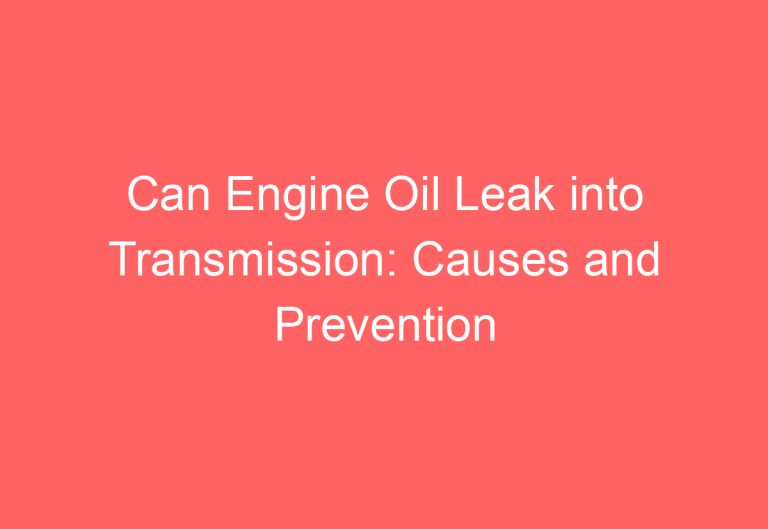Can a Car Start Without Engine Oil? Explained
When it comes to car maintenance, engine oil plays a vital role in ensuring the smooth running of the vehicle. It lubricates the moving parts of the engine, reducing friction and wear and tear. But what happens if a car is started without engine oil? Can it still run?
The short answer is yes, a car can start without engine oil. In fact, every time a car is started, it runs briefly without oil, until the oil pressure builds up. However, running a car without oil is not recommended, as it can cause serious damage to the engine. The lack of lubrication can cause the moving parts to grind against each other, leading to overheating and eventually engine failure.
It is important to note that engine oil is not only responsible for lubrication, but also for cooling the engine. Without oil, the engine can overheat, causing even more damage. Therefore, it is crucial to regularly check the oil level in your car and ensure that it is always at the recommended level. In the next section, we will explore the consequences of running a car without engine oil in more detail.
Understanding the Role of Engine Oil
Engine oil is a vital component that plays a crucial role in the proper functioning of a car’s engine. It is responsible for lubricating, cleaning, and protecting the engine’s internal components from damage caused by friction, heat, and contaminants.
Lubrication and Engine Protection
One of the primary functions of engine oil is to provide lubrication to the engine’s moving parts. As the engine runs, the oil forms a thin film between the metal surfaces, reducing friction and wear. This helps to prolong the life of the engine and prevent damage to its components.
Moreover, engine oil also acts as a protective barrier between the metal surfaces, preventing direct contact and reducing the risk of damage caused by metal-to-metal contact.
Heat Management and Cooling
Another important function of engine oil is to help manage heat and cool the engine. As the engine runs, it generates a lot of heat due to the friction created by moving parts. Engine oil helps to absorb and dissipate this heat, preventing the engine from overheating and causing damage to its components.
Cleaning and Contaminant Control
Engine oil also plays a crucial role in cleaning the engine and controlling contaminants. As the engine runs, it accumulates dirt, debris, and other contaminants that can cause damage to its components. Engine oil helps to trap these contaminants and prevent them from circulating throughout the engine.
Furthermore, engine oil also contains additives that help to break down and remove harmful deposits and contaminants from the engine. This helps to keep the engine clean and running smoothly, reducing the risk of damage and prolonging its life.
In conclusion, engine oil is a critical component that plays an essential role in the proper functioning of a car’s engine. It provides lubrication, heat management, cleaning, and protection to the engine’s internal components, reducing the risk of damage and prolonging its life. It is important to ensure that the engine oil is of the proper type and level, and that the oil filter is changed regularly to ensure optimal performance and protection.
Consequences of Running Without Oil
Immediate and Long-Term Engine Damage
Running a car without engine oil can cause immediate and long-term damage to the engine. The engine oil lubricates the moving parts of the engine and helps keep it cool. Without oil, the engine components will rub against each other, leading to increased wear and tear. This will cause the engine to overheat and eventually seize up, leading to irreparable damage to the engine.
If the engine is run without oil for an extended period, it can cause the engine to fail completely. The metal parts of the engine will start to warp and melt due to the excessive heat generated by the friction between them. This can lead to a catastrophic engine failure that can be expensive to repair or even require a complete engine replacement.
Warning Signs and Prevention
One of the most common warning signs of low oil levels is the oil pressure warning light. This light indicates that the oil pressure is low and that there is a risk of engine damage. If this light comes on, it is essential to stop the car immediately and check the oil level.
Regular maintenance and checking the oil level with a dipstick can help prevent running a car without oil. It is recommended to check the oil level at least once a month or before any long trips. It is also important to change the oil and oil filter regularly, as recommended by the manufacturer.
In summary, running a car without engine oil can cause severe and irreversible damage to the engine. It is essential to check the oil level regularly and have regular maintenance to prevent this from happening. If the oil pressure warning light comes on, it is crucial to stop the car immediately and check the oil level.
Frequently Asked Questions
What are the symptoms of a car running with insufficient oil?
When a car runs with insufficient oil, it may produce unusual engine noises, such as knocking or ticking sounds. The engine may also overheat, and the oil pressure warning light may turn on. In some cases, the car may even stall or fail to start.
How long can a vehicle operate after the engine oil runs out?
A vehicle can only operate for a few minutes after the engine oil runs out before it seizes up. The exact time depends on the car’s make and model, as well as the driving conditions.
What immediate effects occur to a car’s engine started with no oil?
Starting a car with no oil can cause severe damage to the engine. The metal components in the engine can rub against each other, causing heat and friction, which can lead to warping, cracking, and other types of damage.
Is it possible to revive a car by simply adding oil after it has died due to lack of oil?
No, adding oil to a car after it has died due to lack of oil is not sufficient. The damage caused to the engine is irreversible, and the engine will need to be rebuilt or replaced.
What are the consequences of driving a car with an overdue oil change?
Driving a car with an overdue oil change can cause damage to the engine, reduce fuel efficiency, and increase the risk of engine failure. It is essential to follow the manufacturer’s recommended oil change schedule to maintain the car’s optimal performance.
Does an engine automatically shut off when it runs out of oil?
No, an engine does not automatically shut off when it runs out of oil. The engine will continue to run until it seizes up due to the lack of lubrication. It is crucial to check the oil level regularly and add oil as needed to prevent engine damage.










